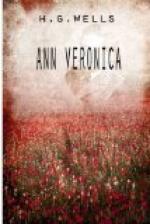She walked down the station approach, past the neat, obtrusive offices of the coal merchant and the house agent, and so to the wicket-gate by the butcher’s shop that led to the field path to her home. Outside the post-office stood a no-hatted, blond young man in gray flannels, who was elaborately affixing a stamp to a letter. At the sight of her he became rigid and a singularly bright shade of pink. She made herself serenely unaware of his existence, though it may be it was his presence that sent her by the field detour instead of by the direct path up the Avenue.
“Umph!” he said, and regarded his letter doubtfully before consigning it to the pillar-box. “Here goes,” he said. Then he hovered undecidedly for some seconds with his hands in his pockets and his mouth puckered to a whistle before he turned to go home by the Avenue.
Ann Veronica forgot him as soon as she was through the gate, and her face resumed its expression of stern preoccupation. “It’s either now or never,” she said to herself....
Morningside Park was a suburb that had not altogether, as people say, come off. It consisted, like pre-Roman Gaul, of three parts. There was first the Avenue, which ran in a consciously elegant curve from the railway station into an undeveloped wilderness of agriculture, with big, yellow brick villas on either side, and then there was the pavement, the little clump of shops about the post-office, and under the railway arch was a congestion of workmen’s dwellings. The road from Surbiton and Epsom ran under the arch, and, like a bright fungoid growth in the ditch, there was now appearing a sort of fourth estate of little red-and-white rough-cast villas, with meretricious gables and very brassy window-blinds. Behind the Avenue was a little hill, and an iron-fenced path went over the crest of this to a stile under an elm-tree, and forked there, with one branch going back into the Avenue again.
“It’s either now or never,” said Ann Veronica, again ascending this stile. “Much as I hate rows, I’ve either got to make a stand or give in altogether.”
She seated herself in a loose and easy attitude and surveyed the backs of the Avenue houses; then her eyes wandered to where the new red-and-white villas peeped among the trees. She seemed to be making some sort of inventory. “Ye Gods!” she said at last. “What a place!
“Stuffy isn’t the word for it.
“I wonder what he takes me for?”
When presently she got down from the stile a certain note of internal conflict, a touch of doubt, had gone from her warm-tinted face. She had now the clear and tranquil expression of one whose mind is made up. Her back had stiffened, and her hazel eyes looked steadfastly ahead.
As she approached the corner of the Avenue the blond, no-hatted man in gray flannels appeared. There was a certain air of forced fortuity in his manner. He saluted awkwardly. “Hello, Vee!” he said.




